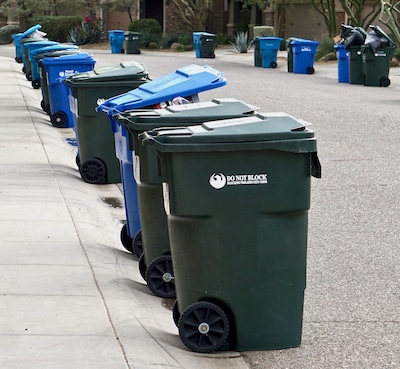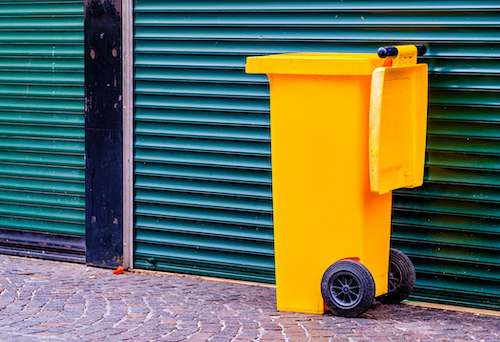By David Zimmerman
Alumnus, Environmental Policy and Management; Vice President, APUS Chapter of the National Association of Environmental Professionals (NAEP); and LEED® Green AssociateTM
If you have ever traveled – whether in the United States or around the world – you may have noticed that communities handle recycling differently. When my family relocated to Germany, we almost needed a course on how to properly recycle our trash.
Recycling is taken very seriously in Germany. In fact, Germany is considered a world leader in recycling, according to Earth.org.
Related: Climate Change and Why All of Our Parks Need Our Assistance
How US Recycling Differs from German Recycling
Back in Illinois, my family and I used a 96-cubic foot trash can that was emptied weekly. We also had a 96-cubic foot mixed stream recycling trash can, which was emptied every two weeks.

By contrast, we use a 120-liter garbage can in Germany that is emptied once a month. We also utilize yellow bags for plastic and metal, blue bags for paper products, white bags for glass products, and a green can for bio/organic waste.

When your recycling in Germany arrives at the recycling facility, it is sorted by hand to ensure each item is recycled properly. From big aluminum cans to small pieces of aluminum foil, it is all recycled.
If you have special items such as electronic products, hazardous materials or bulky items, there is a collection vehicle that comes to each village on occasion. In addition, you can take these types of products to a disposal facility.
Germany has also passed strict laws regarding the disposal of trash. If you are caught trying to illegally dump trash by the road or a forest, you face penalties such as heavy fines and jail time, notes Handbook Germany.
In addition, Germany has taken other steps to reduce waste, which is a better solution than recycling alone. In July 2021, for example, Germany banned products made from single-use plastic to further reduce waste.
Getting Money Back from Trash
Germany also uses a “Pfand” (deposit) system for most glass and plastic containers. When you buy a bottled product at a store, you pay a small deposit that ranges from 15 to 25 euro cents. If you return the bottle to any store, you receive your deposit back.
In large German cities, many people leave their empty glass and plastic bottles by trash cans. That way, the homeless can pick them up and return them for the deposit – it’s sort of a welfare program.
Related: Egyptian Geese: Why a Non-Native Species Can Cause Problems
What Lessons Can the US Learn from German Recycling?
The takeaway for the United States is that we need to do better with our trash disposal and recycling. According to one study published in Science, the United States has the highest plastic waste generation in the world.
Some U.S. states have a deposit or refund system like Germany to encourage recycling, but this system is needed for all 50 states. People are much more inclined to recycle if they have a financial incentive.
The U.S. also needs to follow Germany’s lead and ban single-use plastics nationwide. This act alone would help to prevent millions of tons of plastic from ending up in the waste stream each year.
Instead of being the world’s biggest polluter, the U.S. could improve its recycling practices and become the world’s biggest recycler. After all, we only have one Earth.
LEED is a registered trademark of the U.S. Green Building Council.
About the Author
David Zimmerman was previously employed as an environmental physical scientist with the U.S. Army in Landstuhl, Germany, and a Leadership in Energy and Environmental Design (LEED®) Green AssociateTM. He holds an associate degree in general studies, a bachelor’s degree in psychology, and a master’s degree in environmental policy and management, all from American Military University. In addition, David has earned certificates in environmental science, water quality standards, leadership development and environmental coordinator supervision. He serves as the Vice President of the University’s chapter of the National Association of Environmental Professionals.

Comments are closed.